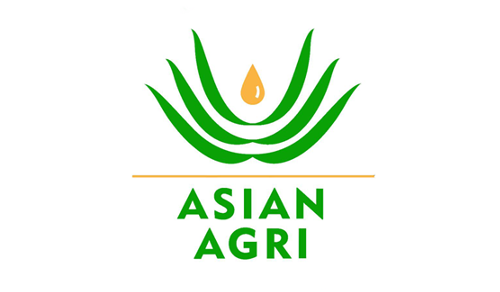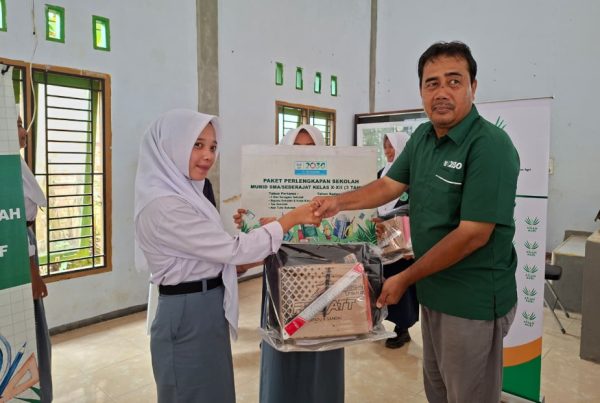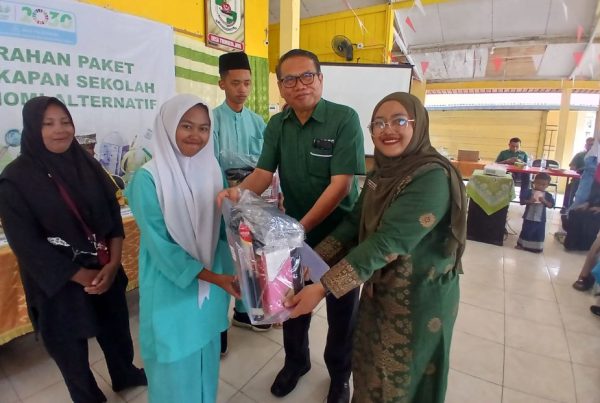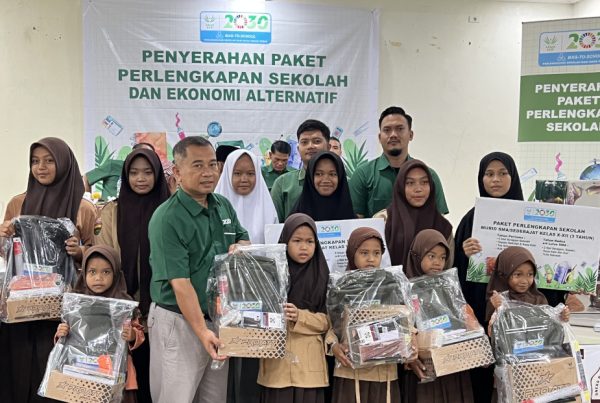Jakarta, March 29th, 2016 — A cooperative of 500 oil palm farmers from the Sumatran province of Riau are on track to becoming the first independent farmers certified under the government of Indonesian sustainable palm oil standard (ISPO) thanks to a multistakeholder training initiative, which began on Tuesday, March 29th 2016.
The training phase of the pilot project — which is supported by the Ministry of Agriculture and the United Nations Development Programme (UNDP) in partnership with palm oil company Asian Agri — is expected to take three months to complete and will involve workshops on good agriculture practice and effective plantation management for improving yields. SNV Netherlands Development Organisation and Asian Agri will facilitate the training and technical support for the independent farmers.
Once the training is complete, the Amanah cooperative will be independently assessed for its adherence with ISPO’s Principles and Criteria. If the cooperative passes the audit it will receive ISPO certification, becoming the first group of smallholder farmers in the nation to do so.
“We are pleased to work with the UNDP and Asian Agri in our pursuit to expand the ISPO standard to Indonesia’s smallholder farmers. These farmers are the most vulnerable to market demands for sustainable palm oil and require the most support,” said Director of Perennial and Beverages Crops for the Directorate General of Plantations at the Ministry of Agriculture, Dwi Praptomo Sudjatmiko.
Today, smallholder farmers are responsible for over 40 percent of the oil palm plantations spread throughout the archipelago. These farmers, on average, manage just 2 hectares of land and they contribute to over a third of the nation’s total palm oil supply. Unlike large multinational companies with unwavering access to capital and resources, smallholder farmers cannot afford the vast investment required to switch to long-term sustainable practices and many are simply unaware of how to productively manage their crop.
The outcome of the smallholder pilot training phase in Pelalawan, Riau, is expected to form a blueprint on how best to scale-up ISPO certification throughout Indonesia’s oil palm producing regions and increase the capacity of the nation’s estimated two million smallholder farmers, many of who struggle to achieve industry average yields.
“This pilot project is a small stepping stone in a much larger effort to achieve sustainable palm oil in Indonesia without cutting small-scale farmers out of the global supply chain. We must build a strong connection between poverty reduction and environment protection and ensure that the poor are included in the vital effort to conserve Indonesia’s enviable biodiversity and ecosystems,” said Christophe Bahuet, UNDP Indonesia Country Director.
“Asian Agri is committed to improving the capacity of independent smallholders, to ensure that sustainable practices directly benefit developing communities. Sustainable plantation practices are now an obligation in the oil palm industry and are expected to go and going beyond their own supply chains industry players. We hope to identify and reform regulatory barriers through this process so that others in the private sector will follow our lead and partner with the government,” said Freddy Widjaya, Director of Asian Agri.
Results and lessons learned throughout the period of smallholder training and certification, estimated to cost $30,000 USD, will inform the government-led Indonesia Palm Oil Platform (InPOP) as it drafts the framework for a National Action Plan for Sustainable Palm Oil set to be finalized and implemented in 2018.
***
Notes for the editor:
About the Indonesian Sustainable Palm Oil Initiative (ISPO)
ISPO – launched in 2011 and amended in 2015 to include P&C for plasma and independent smallholder – is a national certification scheme, which sets the legal standard for good agricultural practices and environmental management. ISPO, which is comprised of laws from a number of relevant ministries, is expected to bring much needed transparency and legality into the palm oil supply chain, in turn resulting in improved livelihoods for smallholders. Currently 200 companies and mills have been formally ISPO certified. Mandatory ISPO certification for companies and mills as well as support for smallholders to achieve voluntary ISPO is expected to be scaled-up over the coming years.
About the UNDP’s Sustainable Palm Oil Initiative (SPOI)
In order to facilitate sustainable palm oil production in Indonesia, the Ministry of Agriculture, United Nations Development Programme (UNDP) and several multinational corporations have partnered to develop the Sustainable Palm Oil (SPOI) Initiative, with aims at helping Indonesia break new ground in terms of building a greener economy that promotes growth, equity and better livelihoods.
The establishment of SPOI is in line with the UNDP’s mission to help countries such as Indonesia find ways to ensure that economic growth becomes sustainable and empowers the farmers and the marginalized population. SPOI has played an instrumental role in supporting the government’s establishment of the Indonesia Palm Oil Platform (InPOP), a multistakeholder forum, which aims to develop a National Action Plan for the sustainability of palm oil.
About Asian Agri
Asian Agri is one of Indonesia’s leading private companies, producing crude palm oil (CPO) since 1979 and currently employs 25,000 people. Since 1987, Asian Agri pioneered the Indonesian government Nucleus Estate Settlements/ Perkebunan Inti Rakyat Transmigrasi (PIR -Trans) program. Currently, Asian Agri manages 100,000 Ha of land and partners with 30,000 smallholder families in Riau And Jambi who operate 60,000 Ha of oil palm estates.
For more information contact:
| Elly Mahesa Jenar | Rebecca Lake |
| Corporate Communications Manager | UNDP and InPOP Communications Officer |
| E-mail: Elly_Mahesa@www.asianagri.com |
Email: rebecca.lake@undp.org; info@inpop.id |
| Mobile: +62 811 8776 729 | Mobile: +62 813 106 34343 |





